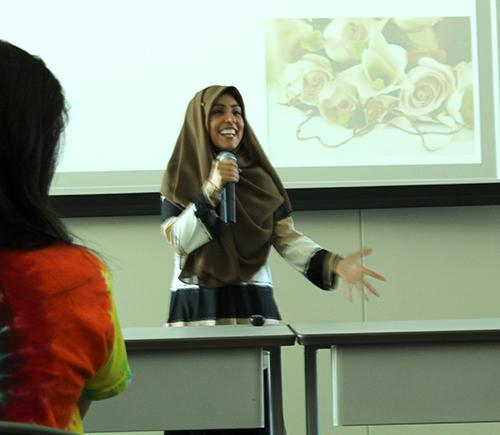Speaker addresses misconceptions of Islam

Author, speaker and lifestyle coach Zohra Sarwari speaks to students about American perceptions of Muslim women on Monday.
In the midst of Women’s History Month, the Muslim Student Association began Islam Awareness Week with a guest speaker, Zohra Sarwari, who spoke about the achievements, history and life of women in Islam to a full room on Monday.
Sarwari is an international speaker and author of more than 28 books and is a life and business coach, according to her website.
She began her speech with, “as-salāmu ʿalaykum,” which means “peace and blessings of God be upon you.”
“My audience primarily are non-Muslims and my purpose is to enlighten and teach them about the faith and understanding the bridging gaps,” Sarwari said.
Her purpose in holding the informative talk was to address the misconceptions associated with a Muslim woman.
“People always ask [Muslim] women, ‘Do you feel like your religion is pushed on you? Do you feel oppressed?’ That’s what we mainly get,” said Vice President of MSA, Halimeh Edais, 19, international relations major.
Muslim women are not oppressed, Sarwari said. She added that Muslim women have the choice on whether or not they choose to wear a hijab, niqab or an abaya. The choice aligns with their faith and level of piety.
“There’s only one reason to why we dress the way we do,”said Sarwari. “It’s not because we want to be modest, it’s not because it’s our tradition, it’s not because of men, it’s because God has asked us to. God has asked us to do this for our own protection. Everyone should respect me for my mind, my brain, my heart, my compassion, and everything else about me.”
This misunderstanding has been built upon from how Islamic culture is portrayed negatively in the media, Sarwari said.
Studies conducted by MediaTenor, an international research institute led by Roland Schatz, have “provide[d] hard data that confirm and elaborate on this commonly-held notion [of] Western media coverage of Islam has been almost exclusively negative.”
Sarwari said she believes the media only projects a majority of one side, and only one argument, which creates an injustice because of a lack of facts.
“Bill Maher and Bill O’Reilly [are examples],”said Sarwari. “They don’t know anything about Islam and they talk for hours about it. These people have millions of viewers, and sometimes that’s all they watch, that’s all they hear, they don’t go and do their own research and starts to build in them.”
Sarwari mentioned fans constantly asked her why she has not been interviewed, but both CBS and Fox News have interviewed her.
“I am interviewed, but do you know how much time they give me? Only 50 seconds on YouTube. It was a 10-minute interview,” said Sarwari. “Why do you think they didn’t put the rest up?”
She mentions they only want to hear bad things and take those out of proportion.
As a result of this, Sarwari said that many muslims are afraid of the hate crimes and are “dying in the struggle against jihadist.”
According to a December 2014 article by BBC, “What is jihadism?”, a violent Islamist associates “a noble religious concept with illegitimate violence.”
“I think that if you really study Islam or just a basic understanding, you’ll see that we, Islam, directly combats terrorism,” said President of MSA Kaleemah Muttaqi, 18, international relations major. “It’s unfortunate that we’re being linked with people who are out to get us, we’re the victims of these attacks and yet we’re being demonized as the perpetrator of these crimes.”
Sarwari mentions that in every culture, criminals exist and they should not define the entire population.
“Right now in all of our cities, it doesn’t matter what your race is, what your nationality or religion is, you’re always going to have someone bad,” said Sarwari. “You cannot judge them from a small group, if you’re doing that, you’re being unjust.”

Jash • Mar 30, 2017 at 5:06 pm
“She added that Muslim women have the choice on whether or not they choose to wear a hijab, niqab, or an abaya.”
Women in Saudi Arabia and Iran have no choice but to wear a hijab-like covering. Women may be arrested, harassed or punished for not wearing one. In both countries, there are government vice squads that enforced Islamic dress on women. In many other places, women may be threatened by family or community for not covering.